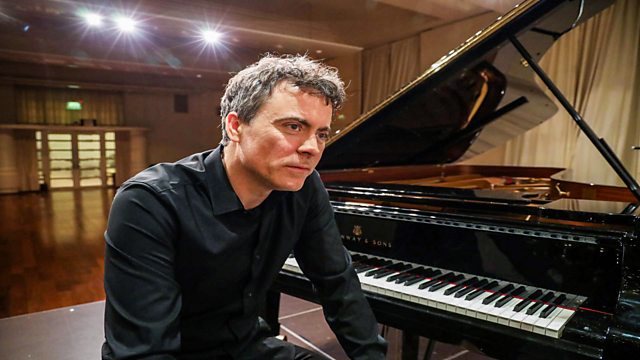
Episode 2
Beethoven embarks on a new creative path and attempts to find love. But, as is often the case, the composer's life appears to be following a very different trajectory to his art.
Unfolding chronologically, Being Beethoven grapples with the living, breathing, human being often lost behind the myth of the romantic genius. Beethoven emerges as a man of contrasts and extremes - driven by love, anguish, fury and joy - qualities woven through both his life and his music.
By returning the composer to the context of his own time and place, the man who emerges is a complex and often contradictory individual - living a life marked by isolation, ill health and deafness. One who, despite the frequent wretchedness of his personal circumstances, manages to create musical masterpieces that have enthralled and uplifted the world for 250 years.
This episode sees Beethoven return to the town of Heiligenstadt, where the year before, devastated by the loss of his hearing, he had written the Heiligenstadt Testament; a document in which he contemplates suicide before finally resolving to embark on a new creative path. The works that he produces during this period — from the earth-shattering Eroica through to his Seventh Symphony — amount to one of the most extraordinary outpourings of creativity in the history of music.
However, as is so often the case, Beethoven’s life follows a very different trajectory to his art. The composer’s repeated attempts to find love with the same type of woman - young, beautiful and aristocratic - will result in his letter to the ‘Immortal Beloved’, a woman whose identity remains mysterious to this day.
Highlights include Martin Haselböck conducting a period performance of the Third Symphony in the hall in which it was premiered, and the Takács Quartet performing the electrifying finale to the Third Rasumovsky Quartet. As well as interviews with Beethoven biographers and scholars such as Jan Swafford and Barry Cooper, the series features contributions and performances from musicians including Iván Fischer, Marin Alsop, the Takács Quartet, Evelyn Glennie, Paul Lewis, Mark Padmore, and Chi-chi Nwanoku.
Last on
More episodes
Previous
Next
Music Played
-
![]()
Leonard Bernstein, New York Philharmonic Orchestra
Symphony No. 3 In E-Flat Major, Op. 55 "Eroica" (Remastered): I. Allegro Con Brio
-
![]()
Alafur Arnalds
Ypsilon
-
![]()
Chicago Symphony Orchestra, Fritz Reiner
Symphony No. 6 In F Major, Op. 68 "Pastorale": III. Lustiges Zusammensein Der Landleute
-
![]()
Los Angeles Philharmonic
Beethoven: Symphony No.5 In C Minor, Op.67 - 1. Allegro Con Brio
-
![]()
Seiji Ozawa, Chicago Symphony Orchestra
Symphony No. 5 In C Minor, Op. 67: I. Allegro Con Brio
-
![]()
Boston Symphony Orchestra
Howard's End (Beethoven: Symphony No 5 - Movement One)
-
![]()
Oliver Schnyder, Luzerner Sinfonieorchester, James Gaffigan
Piano Concerto No. 5 In E-Flat Major, Op. 73: III. Rondo. Allegro
-
![]()
Arthur Rubinstein, Symphony of The Air, Josef Krips
Piano Concerto No. 5 In E-Flat Major, Op. 73 "Emperor": III. Rondo. Allegro
-
![]()
English Symphony Orchestra: Boughton
Beethoven: Piano Concerto No 5 In E Flat Opus 73 (Emperor): 3Rd Movement, Rondo
-
![]()
Yundi
03 Beethoven Piano Concerto No 5 (3 Rondo. Allegro)
-
![]()
New York Philharmonic, Jaap Van Zweden
05 Beethoven Symphony No.7 In A Op.92 - I.Poco Sostenuto
-
![]()
Fritz Reiner and The Chicago Symphony Orchestra
Symphony No. 7 In A (Op. 92) Allegro Con Brio
Credits
| Role | Contributor |
|---|---|
| Editor | Chris Buckland |
| Executive Producer | Ross Wilson |
| Producer | Flora Stewart |
| Producer | Phil Cairney |
| Director | Phil Cairney |
| Production Company | Matchlight |
Broadcasts
- Mon 13 Jul 2020 21:00
- Tue 14 Jul 2020 03:00
- Tue 14 Jul 2020 23:25
- Mon 12 Sep 2022 02:20
- Sun 23 Jul 2023 23:05

